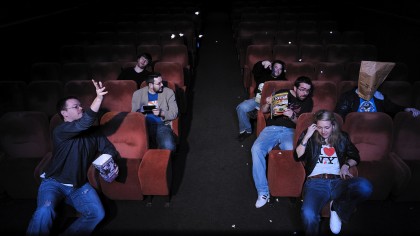Will Hollywood ever embrace VR?
We all know gaming is about to get virtual reality, but what about movies?
There's an interesting middle-ground
Rather than making a fully immersive, 360 degree movie there's another solution that works surprisingly well: you simply watch movies on your VR device as you would with a TV.
There are lots of advantages to this. You get a massive picture that dominates your vision, you can have excellent 3D, if you're interested in that, and you can even select how large you want the film to appear in front of you.
Want the sensation of a massive IMAX screen? No problem, you'll just have to look around a bit more.
There's also the possibility of hooking up with your other VR-toting buddies in a virtual cinema environment too. VR is such an isolating technology having something to combat this, especially in what has traditionally been a relatively social, shared activity, could be a very good thing.
Though the first person to mod in support for throwable popcorn might not be that popular...

New audio technology coming to phones - that we have seen, thanks to Qualcomm - shows just how good surround sound is going to get with headphones soon. It appears likely that within a few years we'll be having a movie experience at home that's better than any cinema, and with loads of great advantages over a regular TV.
Oculus VR has the solution
The best hope for VR movies comes, unsurprisingly, from Oculus itself. It has set up a movie studio called "Story Studio". It has even produced a film called Lost, which has already been shown - and was well-liked - and it has plans for more movies this year and next.
Sign up for breaking news, reviews, opinion, top tech deals, and more.
These are animated features, so can be rendered on the fly as you're watching them.
This means there's no lack of resolution, they can be rendered at the full display resolution, giving amazing quality. It also means you can have things interact with you while you watch.
Perhaps not a fully immersive experience, but a way to guide you to look at certain things.
If Oculus Rift, Project Morpheus and Vive sell, then this could be a boon industry. It won't be long before big names want to be involved, and it's this that is where VR entertainment will start.
VR is likely to come with some high costs
For gaming we already know that you need a top-end PC to power Oculus Rift. Only Nvidia and AMD's highest-powered GPUs will be fast enough and you need a lot RAM and CPU power too.
The good news is that VR movies will likely need less power.
Of course that will depend enormously on how they work. If you want good quality, we're still talking about displaying a lot of pixels and your hardware will need to be able to decode very high resolution video, which has its own challenges. Perhaps less than games, but it's still going to need some power to work well.
Conclusion
So, what's the future for VR home entertainment?
Well, games are good to go. We've seen them work, and they're amazing. VR animation is shaping up too. Reports by those who have seen Lost from Oculus' Story Studio are good.
It's an exciting and immersive experience and it will bring something new to entertainment.
If you're hoping that all movies will be shot in 360 degrees, then you're in for a disappointment. The issues here are huge. It's technically difficult, it will be hard to get existing directors to consider it and it won't actually add much to a normal movie experience.
Perhaps we'll see something of a compromise.
Perhaps movies shot in IMAX will allow us to look around the frame slightly, and give us more control. We might see more of the sort of thing that Samsung's Gear VR had with the demo clip from The Maze Runner giving us an image that wrapped around us, for a more immersive feel.
One thing's for sure, VR is exciting and will hopefully be a big part of entertainment over the coming years.
We probably won't be wearing VR headsets for movie night, but we may well have new experiences with VR content that runs in a linear manner, as movies do. They will, however, need to be quite different to traditional films to really work.
- 1
- 2
Current page: There are alternatives to 360-degree movie-making...
Prev Page The trials and tribulations of VR cinema